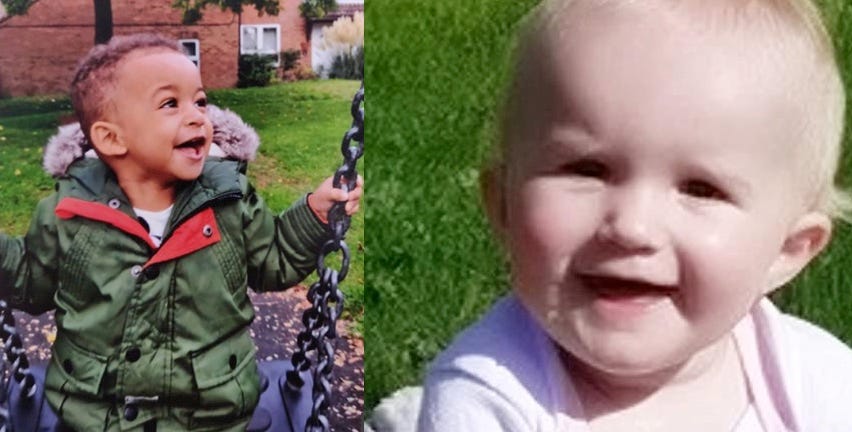Special report: Is Northamptonshire children's services improving quickly enough?
We take a closer look at Ofsted's recent findings
By Natalie Bloomer and Sarah Ward
A recent Ofsted report on Northamptonshire’s children’s services notes that improvements are being made - but given how terrible things were previously, is this progress happening quickly enough for the vulnerable children of our county? And if not, will the public know about it?
Today we take a closer look at Ofsted’s findings, highlight the problems which still exist and ask if there is enough transparency and scrutiny around the new children’s trust.
The report
Last week Ofsted wrote to the joint director of children’s services for West and North Northamptonshire Cathi Hadley following a monitoring visit in July. It said leaders were focused on ‘improving practice’ which has resulted in ‘tangible progress’. However, there were still significant concerns about staffing and the impact on vulnerable children in the county.
The report said improvements have been made in the children’s safeguarding and disabled children’s teams but went on to say it is not consistent and challenges to workforce recruitment and retention remain.
It noted that social workers meet regularly with children, meaning welfare and safety can be monitored closely, but that some children have ‘experienced too many changes of social worker and, for some, this has prevented them from developing trusting, positive relationships with their worker'.
Although assessments are being completed by social workers in a ‘timely way’ the report says the quality of them remains variable.
“Most assessments lack full consideration of children’s unique characteristics, including their culture and heritage. As a result, crucial aspects of their lives are not analysed and are not considered when plans are being formulated to meet their three specific identity needs. Senior leaders have recognised this as an area for development and have plans in place to improve practice.”
The quality of children’s plans were also improving but again it was not consistent.
“Most contingency plans are not specific enough to help families to understand exactly what will happen if their child’s circumstances do not improve...plans are not always updated when circumstances change.”
On the issue of child protection Ofsted said most core group meetings are held regularly with good multi-agency attendance. Information is being shared effectively with parents and between professionals but some cases have been allowed to ‘drift and delay as a result of the lack of focus on what positive change would look like, or due to changes in social workers and team managers’.
The letter said for some children, ‘the impact of neglect has not been recognised soon enough, resulting in them being subject to statutory involvement for too long without sustained positive change being achieved.’
A major issue for children’s services in the county previously was the impact of high caseloads for social workers. According to Ofsted this is still an issue.
“Overall caseloads have reduced. However, senior leaders are aware that some social workers’ caseloads remain too high, and that this is impacting on the quality and consistency of the work that they do with children and families.”
Last Thursday, on the day the report was released, NN Journal asked both North and West unitary councils what the issues were with the retention and recruitment of staff and to confirm how many social worker vacancies there are currently.
We also asked why children are experiencing frequent changes of social workers and whether it is a concern to them that given the serious failings of the past, caseloads are still too high.
We have not received a response from either council, which put out a joint press release titled Ofsted letter highlights improvements to Northamptonshire’s children’s services on the day of the report.
Several years of failure
The tragic deaths of Dylan Tiffin-Brown and Evelyn-Rose Muggleton brought into sharp focus the failings of children’s social services in Northants.
Both were murdered at the hands of their father figures (Dylan died in December 2017 and Evelyn five months later) and both were already known to social services before their deaths.
The reports by the local children’s safeguarding board (published in June 2019) into their deaths were damning and laid bare a department in chaos and said staff had missed opportunities to better protect the youngsters and it had not appreciated the level of danger they were in.
Problems were first flagged up in the service back in 2013 when an extremely critical Ofsted inspection rated the service as inadequate and accused the authority of allowing a ‘legacy of children’ to become exposed to ‘chronic harm and harmful experiences’. They said vulnerable families were being helped, but far too late and criticised some staff’s abilities of knowing when to escalate matters.
The authority then set about changing the department and three years later in 2016 Ofsted said the department had made positive changes and was now in a ‘requires improvement’ category.
But the council was now in the midst of its early stages of its financial meltdown and when it went bust in April 2018 the lid was lifted on the scale of the inadequacies within the authority. It became clear children’s services were in a mess again. A report the following October showed to what extent.
It said:
“The quality of assessment services to children in need of help and protection in Northamptonshire has substantially declined since the single inspection in 2016. Considerable financial instability across the council has led to government intervention and significant challenges in ensuring workforce sufficiency.
“Changes in leadership at corporate and managerial levels have impacted on leaders’ ability to respond to identified weaknesses. Consequently, there is considerable variability in the quality of intervention for children. The impact of this means that some children are not consistently or effectively assessed, supported or protected.”
The following month the Government sent in children’s commissioner Malcolm Newsam, a much respected social worker, who spelled out the extent of the issues within the service.
In his first report about the service in May 2019 he wrote:
“I am concerned that much of the failure within children’s services is long-standing, systemic and improvement will require a fundamental shift in the current culture which is embedded in the service and across the Council.
“There has historically been poor communication with staff on the front-line and a failure by successive senior managers to tackle long-standing problems. In my visits to front-line staff they shared with me many examples of senior managers promising improvements and then not delivering it.
“This has led to significant mistrust by staff in the leadership of the organisation and a cynical disbelief that anything will ever get better. Middle managers have not taken responsibility for their service areas and performance has not been owned by managers throughout the service.
“Significant risks remained particularly in the safeguarding service. Despite the concerns raised by Ofsted, when I arrived at the beginning of December, only 65% of assessments had been completed within 45 days, there were 192 assessments without an allocated worker and 1024 open assessments.
“The first response teams were significantly under-resourced and some social workers were carrying in excess of 50 cases. This chaos in the frontdoor presented considerable risk. It was particularly worrying that this situation was still in place almost twelve months after the circumstances that precipitated the serious case review into the death of a two-year old child.”
But within ten months of his appointment he was gone, among rumours he was unhappy about how the authority - under the direction of new chief executive Theresa Grant was running and the restrictions being put upon the children’s services department by the financial constraints of the authority. He was quickly followed out of the door by the director of the service and her deputy.
Newsam was replaced by a second commissioner, Andrew Christie.
Children’s Trust
In summer 2019 the Government ordered that the failing children’s services department was taken outside of direct local authority management and instead put into the hands of a new independent trust. The model had been used before, the first set up in Doncaster in 2014 and there are now a dozen such trusts across the country. But the jury is out about whether this type of outsourced operations make a major difference.
The statutory responsibility still lies with the local authority, but day to day running of the service is taken over by independent officers.
The trust began operating in November last year and after a false start (the appointed chief executive had to stand down before his work had even begun because of his involvement in a finance scandal in Nottingham) Colin Foster was appointed as the chief executive.
The trust is still overseen by a children’s commissioner, although Andrew Christie has not issued a public report since June last year. He has also not been seen at a public council meeting in several months.
Anecdotally NN Journal has been told by a number of sources, including local politicians and those who work within the service that Colin Foster is well-liked, respected and appears to be doing a good job.
But just what is happening within the trust, which has a five-year contract - is unclear as it has very little public engagement or scrutiny.
Since it began last November there has not been either a publicly available finance report or any reports into its operations. A brief update on its finances between its start date and March this year will appear in the final finance report for the county council, but despite being due two months ago it is delayed.
According to the latest general finance reports of the councils for this financial year (2021-22), children’s services are expected to come in on budget but there is no detail as to why.
The new councils’ involvement
The two Conservative-led unitary councils are overseeing the trust through its Joint Children’s Trust Committee, but to the dismay of the political opposition it only has members of the two council’s ruling executives on it.
The committee should meet monthly, but has only met once since the new councils began in April and has had three meetings cancelled. The last time it met was in June, when the terms of reference, the service scope and the contract (which had been agreed before November last year) was put before members. The minutes of this meeting are still not publicly available.
Labour councillor Harry Barrett, who is also an assistant head teacher, says there needs to be more information shared with councillors about the situation within the trust.
“Labour has already called for full all member briefings, detailed updates on progress and problems in real time and a collaborative approach. Not having an oversight or briefing of this report and it’s findings beforehand doesn’t fit in with the good nature and direction of the new relationships West Northants has attempted to form over the past 18 months. All councillors from across the floor need information like this and it must be a priority to share that and not find out key information for the first time on Twitter.
“The report highlights the leadership and management have begun to implement significant and much needed change in processes. Improving the lives of our young people and their families has to be a priority and although the reports highlights that progress is being made for which I congratulate Colin and his team, the report still shows some significant concerns.
“It shows we still have too much expectation and reliance on dedicated and over stretched members of staff, we cannot rely on the goodwill of staff. If we continue to give them more casework- they will burn out and leave while also not giving the best service to our young people and their families”
Zoe McGhee, councillor for the Kingswood area of Corby welcomes the improvements and says it is reassuring to know the trust is committed to the welfare of children and focused on the recruitment of staff. But she has concerns about caseloads and the need to ensure all children are given the best support.
“The work I do with children has given me an insight into the problem with social workers being spread too thin with caseloads, resulting in children struggling to feel supported.
“The highlighted need to support children with disabilities and capture their lived experiences, I am sure will now become a priority for the senior leadership team.
“The letter mentions the wellbeing of staff, but there are concerns on staff leaving because of needing more support. If there must be savings, it must not be to the detriment of staff members. Community and youth organisations are also calling for more multi-agency communication. The Trust must continue to work with them.”
Cllr Scott Edwards, North Northamptonshire Council’s executive member for children, families, education and skills, said he is delighted that children’s services continue to be on an upwards trajectory.
“Improving life chances for every child is a key priority for us and we’re all absolutely committed to making sure that we continue on this journey. Progress has been made in some challenging areas and I’m confident that we have the right leaders and staff in place to continue to drive forward further positive change,” he said.
Councillor Fiona Baker, cabinet member for children, families, education and skills at West Northamptonshire Council, said the Ofsted findings were ‘really encouraging and reflect the ongoing efforts of all our colleagues at the children’s trust and councils who are working tirelessly to improve children’s services’.
“We know there is still much work to be done and this latest feedback from Ofsted is invaluable as we continue to work hard to make these services better for children across Northamptonshire.”
Chair of Northamptonshire Children’s Trust Julian Wooster, said:
“We are extremely pleased that Ofsted recognise the quality of our practice is improving and that we have continued to make encouraging progress despite the challenges we faced during the pandemic.
“The Trust is making real progress at all levels and is committed to improving the lives of all children and young people in the county. We are determined to do as much as we can to deliver the best possible services and achieve the best outcomes possible for children, young people and families.”
Thanks for reading. For the full experience of NN Journal please consider becoming a paying member. You can upgrade your membership here








In other words: things are improving, but then again not really.